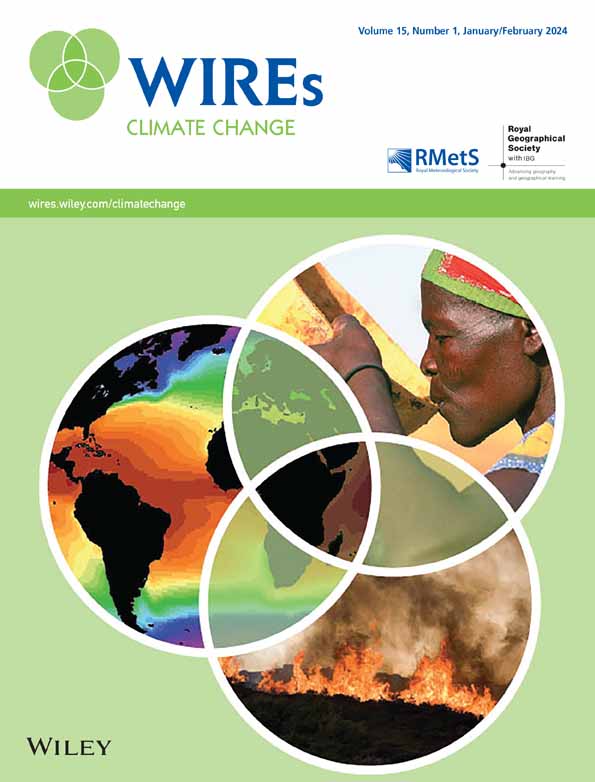全球变暖下的跨境移民:一个政策框架
IF 10.3
1区 环境科学与生态学
Q1 ENVIRONMENTAL STUDIES
引用次数: 4
摘要
移徙往往是由于需要改善社会和经济机会或逃离政治不安全的条件。包括气候变化在内的环境危害风险增加,加大了移民的力度。然而,气候变化与被迫流离失所之间的关系并不是直接的,而且由于全球化、当地生态条件和国内体制的恶化而变得复杂。值得注意的是,这种混乱的情况意味着“这个人是因为气候变化而移民的吗?”这个问题可能永远不会得到完全回答。在伦理论点的基础上,在这篇透视文章中,我们提出了一个框架,既有强烈的回应,也有温和的回应,以解决跨境移民问题。强有力的版本承认,不可能将气候引发的移民原因与其他原因完全区分开来,为此目的进行气候归因研究可能有害。这意味着随着气候变化的影响,为寻求庇护者设计一项开放的政策,同时考虑到对气候变化负有最大责任的东道国应该最欢迎他们。在温和的版本中,国际社会指定了脆弱区,即大片土地容易遭受巨大损失和破坏的地区。这些国家将包括大多数小岛屿国家、那些严重干旱的国家和那些拥有大量低洼三角洲地区的国家。在温和和强烈的版本中,寻求庇护者都有权在不受驱逐的情况下自由前往东道国,这样他们就不会被迫返回无法居住或无法居住的祖国,并面临持续的伤害。本文章由计算机程序翻译,如有差异,请以英文原文为准。
Cross‐border migration on a warming planet: A policy framework
Migration is frequently driven by the need to improve social and economic opportunities or to flee conditions of political insecurity. The increased risks of environmental hazards, including climate change, have intensified the push to migrate. Nevertheless, the relation between climate change and forced displacement is not direct and is complicated by globalization, local ecological conditions, and deteriorating domestic institutions. Significantly, the muddy situation means the question “did this person migrate because of climate change?” may never be fully answered. On the basis of ethical arguments, in this Perspective article we propose a framework with both strong and mild responses to address cross‐border migration. The strong version acknowledges that it is impossible to separate out fully the climate‐induced causes of migration from others and using climate attribution studies for this purpose is potentially harmful. This implies designing an open door policy for asylum seekers as the impacts of climate change unfold, bearing in mind that host countries having the most responsibility for climate change ought to be the most welcoming to them. In the mild version, the international community designates vulnerable zones, areas where significant land area is susceptible to overwhelming loss and damage. Such countries would include most small‐island states, those that are severely drought‐prone and those with substantial low‐lying deltaic areas. In both the mild and strong versions, asylum seekers are provided rights of free passage to host countries under nonrefoulement, so that they are not forced to return to their unliveable or unviable home countries and face continuing harm.
求助全文
通过发布文献求助,成功后即可免费获取论文全文。
去求助
来源期刊

Wiley Interdisciplinary Reviews: Climate Change
METEOROLOGY & ATMOSPHERIC SCIENCES-
CiteScore
20.00
自引率
2.20%
发文量
58
审稿时长
>12 weeks
期刊介绍:
WIREs Climate Change serves as a distinctive platform for delving into current and emerging knowledge across various disciplines contributing to the understanding of climate change. This includes environmental history, humanities, physical and life sciences, social sciences, engineering, and economics. Developed in association with the Royal Meteorological Society and the Royal Geographical Society (with IBG) in the UK, this publication acts as an encyclopedic reference for climate change scholarship and research, offering a forum to explore diverse perspectives on how climate change is comprehended, analyzed, and contested globally.
 求助内容:
求助内容: 应助结果提醒方式:
应助结果提醒方式:


